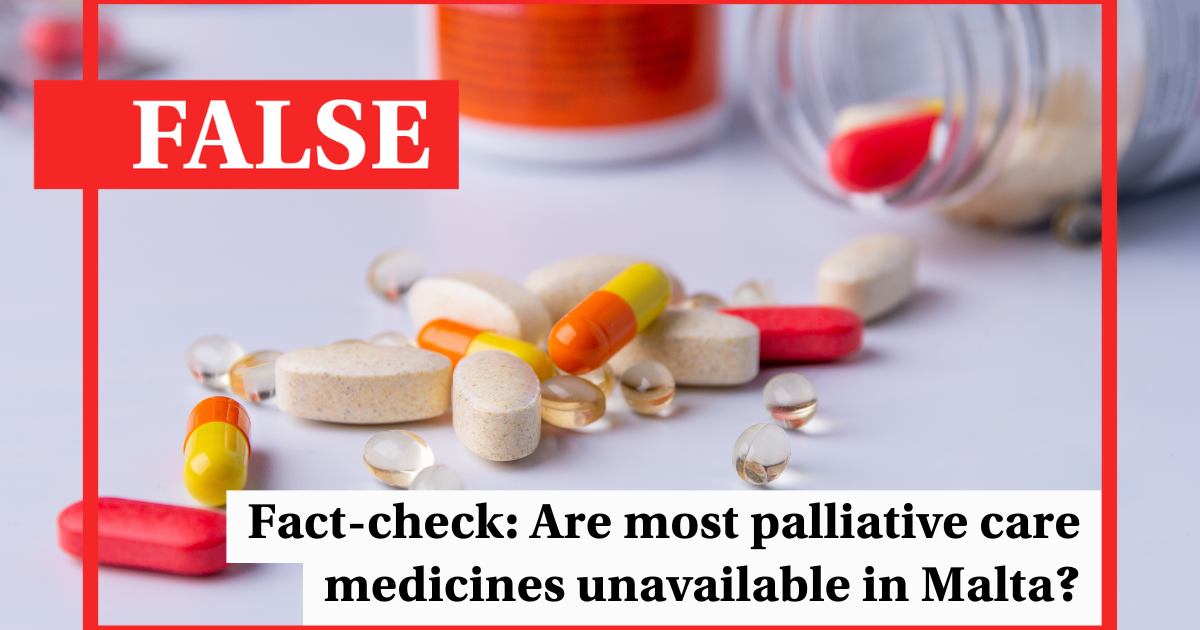Claim: Only a tenth of WHO-recommended palliative care medicines are available in Malta.
Verdict: All of the 22 palliative care medicines recommended by WHO are available on the government formulary.
The ongoing debate on the introduction of euthanasia has sparked a discussion about strengthening palliative care, with various organisations and individuals advocating for improved end-of-life care in Malta.
The discussion recently veered onto the topic of medication, with some claiming that Malta lags behind in its provision of essential medication for palliative care.
While several anti-euthanasia campaigners pointed to this issue (not least the Life Network Foundation, which claimed that only 19 of the 173 medicines related to palliative care are available in Malta), one particular claim stood out.
Fr Emmanuel Agius, a professor of moral philosophy and moral theology, was quoted as saying that just a tenth of palliative care medicines recommended by the World Health Organisation were available in Malta, with a fifth of essential palliative drugs only available through private channels.
The claim, reportedly made during a seminar organised by the Association of Child and Adolescent Mental Health and the Malta Association of Psychiatry Trainees, quickly spread through discussions across social media, although some have questioned its accuracy.
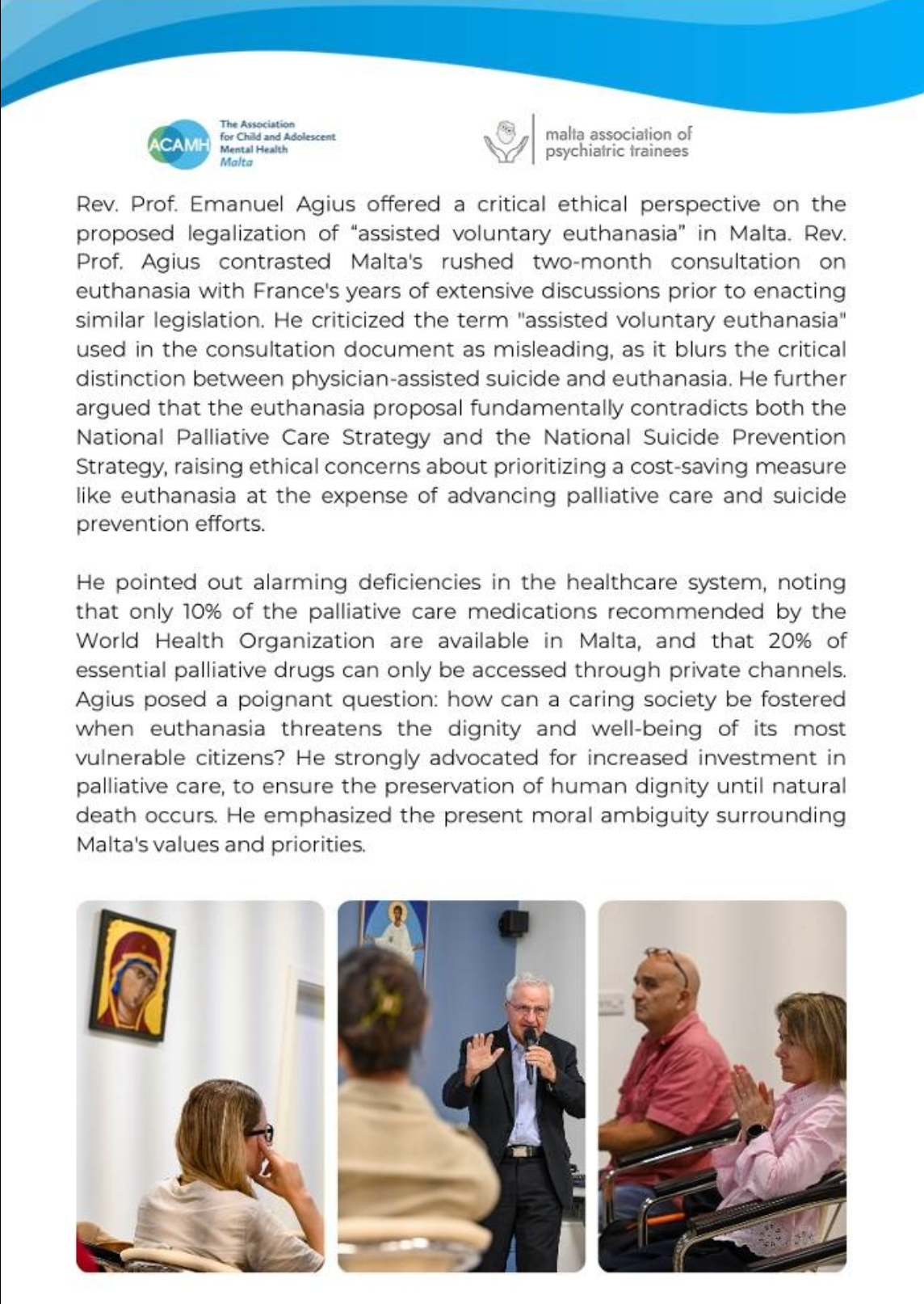 Agius’ claim also featured in the conference organisers’ notes from the seminar posted to their Facebook page.
Agius’ claim also featured in the conference organisers’ notes from the seminar posted to their Facebook page.
The claim also featured on the seminar organisers’ Facebook page, in several posts which presented outcomes from the seminar.
Agius himself, when contacted by Times of Malta, did not confirm the claim, saying that he did not refer to WHO in the seminar, but got the figures from a recent article about Malta’s delays in accessing innovative medication.
The article in question does not refer specifically to palliative care medication, but instead looks at Malta’s slow uptake of innovative medication used to treat a broad range of conditions, from skin disorders to obesity and hormone therapy, as well as a range of serious illnesses such as cancer, HIV and non-Hodgkin lymphoma.
When contacted, Life Network Foundation CEO Miriam Sciberras confirmed that the same study is also the source of the Foundation’s claim that only 19 of 173 palliative care medicines are available in Malta.
The study explored the uptake of 173 innovative medicines between 2020 and 2023, finding that Malta was one of the countries in Europe that took the longest to introduce them to the local market.
As of early 2025, only 17 of the 173 medicines included in the study were available locally.
What does WHO say about palliative care medicines?
Every two years, the World Health Organisation publishes a list of essential medication that is needed to treat a variety of illnesses and conditions. The list aims to provide countries with an indication of what medicines need to be widely available in a functioning health system.
The most recent list was published in July 2023. It features an extensive list of medication, from antibiotics to antiviral medication, each of them to be used to treat different illnesses and conditions.
The list dedicates a specific section to “medicines for pain and palliative care”.
This section includes a total of 22 types of medicines, from run-of-the-mill painkillers such as paracetamol and ibuprofen, to analgesics such as fentanyl and codeine. It also includes various antidepressants, medication to treat insomnia, others that impact the central nervous system, and a range of other drugs.
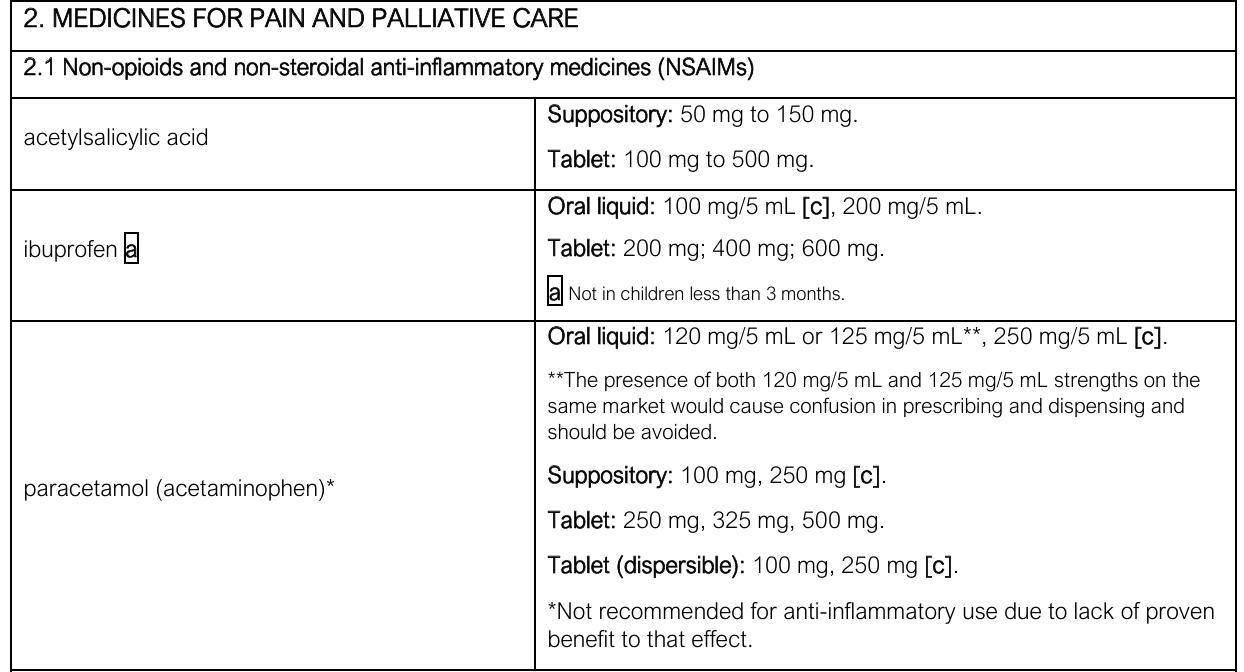 A snapshot of the WHO list of medicines for pain and palliative care.
A snapshot of the WHO list of medicines for pain and palliative care.
How many of the medicines on the WHO list are available in Malta?
All of them.
Of the 22 types of drugs on the WHO list, all 22 are listed on the government’s formulary list, meaning that they are offered by the government free of charge to those in need.
While all 22 medicines are listed on the government’s hospital formulary, meaning they are available within State hospitals, 21 of them are also listed on the outpatient’s formulary, making them available through the Pharmacy Of Your Choice scheme.
The odd one out is methadone, which is only available at hospital.
The formulary also lists who can prescribe each medicine, more often than not listing palliative care consultants (together with oncologists and other consultants) as prescribers.
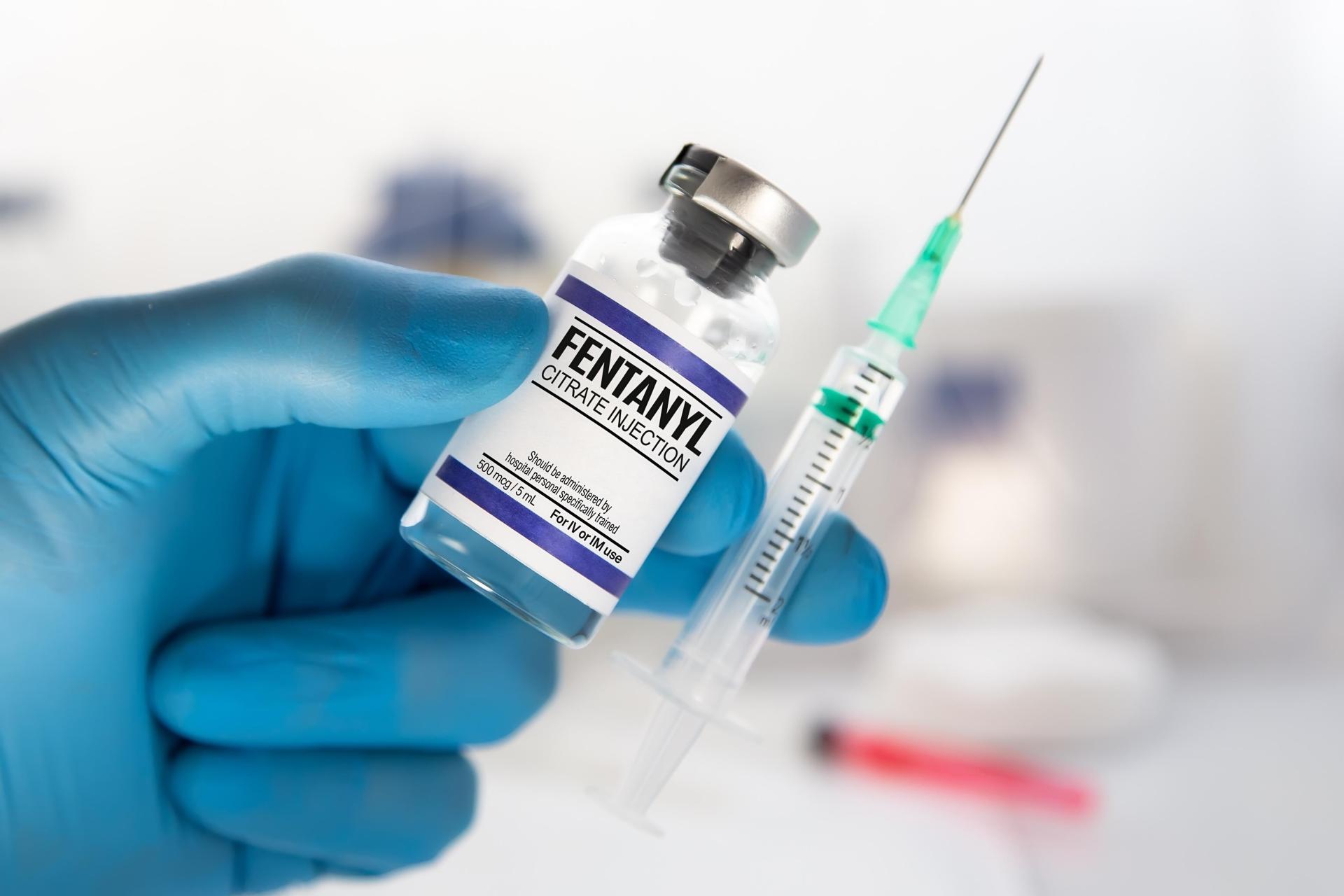 Fentanyl is one of the many drugs recommended by WHO and available in Malta. Photo: Shutterstock
Fentanyl is one of the many drugs recommended by WHO and available in Malta. Photo: Shutterstock
Nevertheless, there are a handful of minor differences between the WHO list and the government formulary.
So, for instance, while WHO says docusate sodium (a laxative) should be available as both a capsule and an oral liquid, the formulary only offers it in tablet form. Likewise, while WHO lists the drug midazolam, used for anesthesia, as an oral liquid or tablet, the formulary only provides it as an injection.
There is also little to suggest that these 22 particular medicines are particularly prone to being out of stock. Recent out of stock medications lists show that while some of the 22 medicines are occasionally unavailable in certain doses, they are usually nonetheless in stock in other forms.
For instance, the most recent out of stock list, published in early June, says that anti-anxiety medication diazepam (widely known as Valium) is unavailable in 2mg or 5ml doses due to a sourcing issue. Nonetheless, the same drug remains available as an injection, a rectal gel or a 5mg tablet.
What about other lists?
Other reputable organisations, aside from WHO, have come up with their own lists of recommended medicines for palliative care.
Perhaps the most prominent in this field is the International Association for Hospice and Palliative Care (IAHCP), which developed a list of 33 essential medicines for palliative care.
Many of the items of this list overlap with those on the WHO list, although the two are not identical.
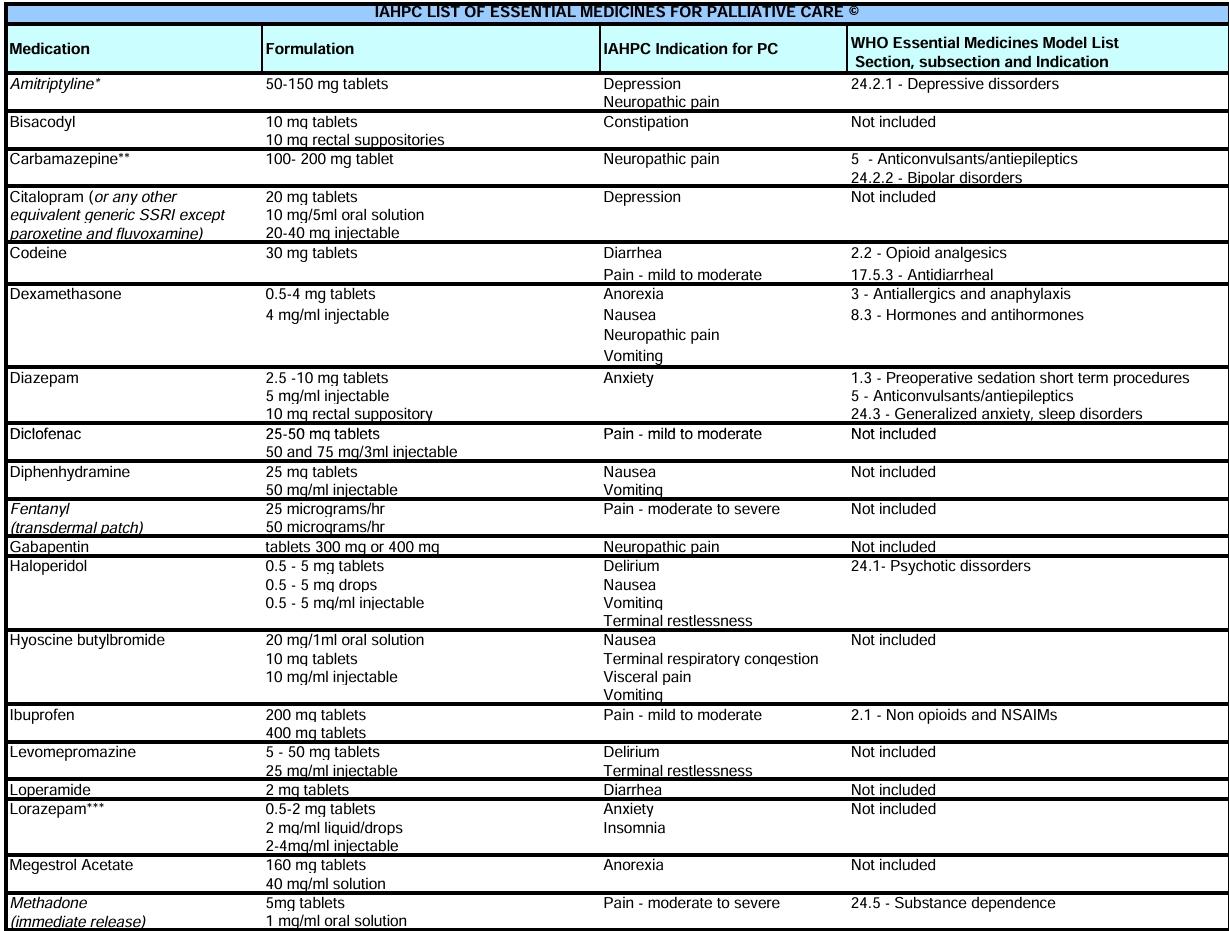 The IAHPC list features several drugs not on the WHO list.
The IAHPC list features several drugs not on the WHO list.
Of the 33 medicines on the IAHCP list, 26 are offered on Malta’s government formulary list.
This does not automatically mean that the remaining seven are unavailable in Malta, only that they would need to be purchased privately.
For instance, the IAHCP list includes popular antidepressant Citalopram which is widely available by prescription in Malta, although it is not available through the formulary.
Palliative care strategy
Although palliative care medicines are widely available in Malta, accessing them could still be more straightforward.
A recently-launched palliative care strategy says that the process of “acquiring the necessary permits for the provision of certain medications can be lengthy and bureaucratic”.
The strategy adds that “certain medications may not be available as routine stock by community pharmacies and must be ordered,” making the process more cumbersome.
The strategy also recommends that health authorities “undertake a review of the medicines formulary and assess for the need to include new medicines to enhance the therapeutic options available,” however, it does not flag the unavailability of medicines as an area of concern.
Nevertheless, the Malta Chamber of Pharmacists, in a position paper published in May, argued that “the healthcare budget is insufficient to procure all medicines on the Government Formulary List; therefore, there is political prioritisation for certain indications and medicines,” leading to a slow uptake of new medicines.
The Chamber also flagged a range of other shortcomings in palliative care, from a lack of resources (both financial and human), to “inequitable” access to palliative care medicines and medical devices or equipment.
 A recent strategy document recommends several measures to strengthen palliative care. Photo: Shutterstock
A recent strategy document recommends several measures to strengthen palliative care. Photo: Shutterstock
Verdict
All of the 22 palliative care medicines recommended by WHO, are available on Malta’s government formulary, although one of them, methadone, is only available at State hospitals.
There are some minor discrepancies between the WHO list and the government formulary, particularly in terms of how each drug is offered.
A similar list of essential medicines for palliative care developed by the International Association or Hospice and Palliative Care features 33 medicines, 26 of which are available on the government formulary.
Several of the remaining seven medicines are also available in Malta, but need to be purchased privately.
The claim that most palliative care medicines are unavailable in Malta is therefore false, as the evidence clearly refutes the claim.
The Times of Malta fact-checking service forms part of the Mediterranean Digital Media Observatory (MedDMO) and the European Digital Media Observatory (EDMO), an independent observatory with hubs across all 27 EU member states that is funded by the EU’s Digital Europe programme. Fact-checks are based on our code of principles.
Let us know what you would like us to fact-check, understand our ratings system or see our answers to Frequently Asked Questions about the service.
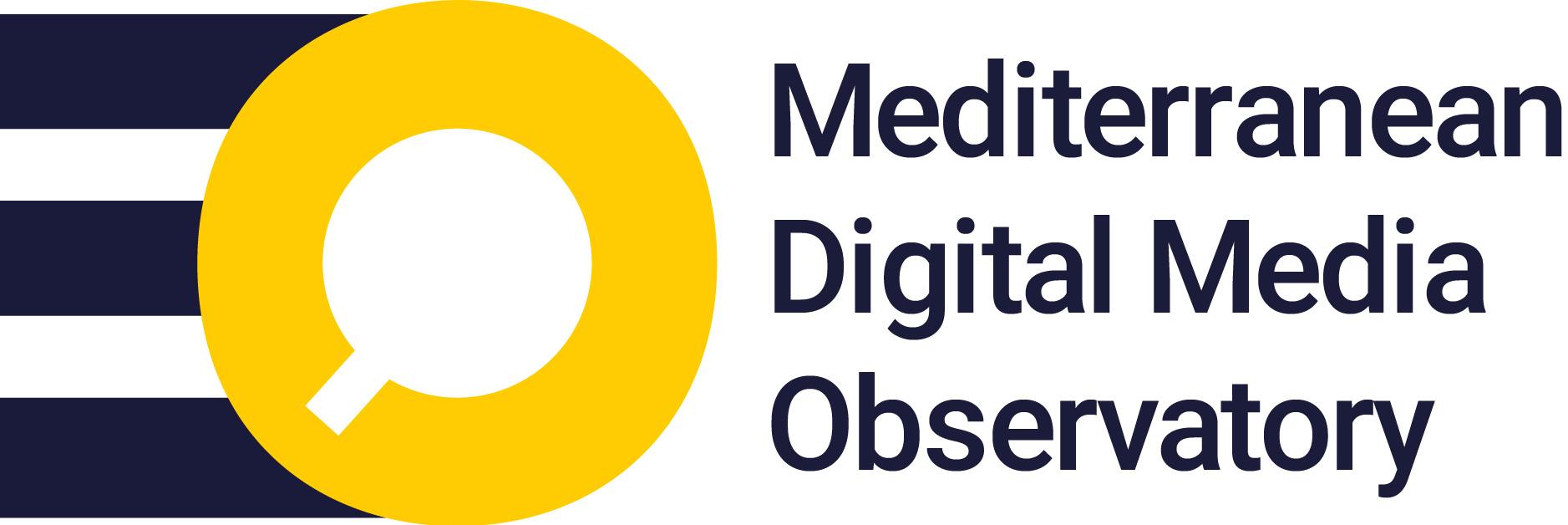 MedDMO
MedDMO
